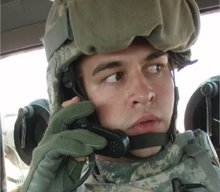I'm a few days late to this party, but I'll post it anyway:
The Washington Post has an excellent piece of journalism entitled
Left of Boom: The Struggle to Defeat Roadside BombsThe article is a series of four parts,
chronicling the appearance of
IEDs and how the often frantic efforts to counter them have finally moved "left of boom"- neutralizing
IEDs and
IED networks before the bombs send more young men home.
I found a very interesting graphic on the article site: the snapshot "
Iraq Hotspots" shows the
IED activity in some of Iraq's hottest cities in May 2007.
Baghdad: 418
IEDs found, 538 attacks
Basra: 6
IEDs found, 13 attacks
Diwaniyah: 46
IEDs found, 82 attacks
Mosul: 78
IEDs found, 109 attacks
Tikrit: 383
IEDs found, 512 attacks
Falluja: 195
IEDs found, 34 attacks
According to the numbers used to construct the graph, the only "hot city" where the find rate for
IEDs was over 50% was
Falluja. In
Falluja in May 2007, the find rate was 85.2%. I have always bragged about the good work that we did in Iraq- this is a material indication of the kind of impact we made. Lest anyone think we had it easy out there- most
IEDs in the
Falluja region from March-April on were large (100lb+), deeply buried
IEDs. Deep buried
IEDs are the difficult to detect specialty of the Sunni insurgency, and they kill more American troops than all other types of
IED save
EFPs. No wonder the commandant of the Marine Corps wishes he had more route clearance!
The article is quite thorough in discussing the various high-tech approaches the military has taken to minimize the
IED threat. In Parts 2&3, there is an extensive discussion on electromagnetic countermeasures (
ECMs, or simply "
jammers"), in which the author notes the complexity of maintaining the multiple distinct systems used in Iraq. Adding to the complexity that the author mentions is the fact that certain types of
jammers wreaked havoc on certain other types. The problem was a
nuisance at best- at worst, a passing patrol could burn out the
incompatible jammers on another patrol and leave the second team vulnerable to radio-controlled
IEDs. Such situations were not common, but they did exist- perhaps such troubles are a natural by-product of the rush to field new equipment. In war, the battlefield becomes the testing ground as disparate systems are thrown together in an attempt to make something work.
The author covers nearly every portion of the
IED fight of which I am aware, with one glaring exception- route clearance. He relates that the human eye and the soldier behind it is "more adept at finding bombs than any machine", but does not follow the thought through to the logical conclusion- make teams of soldiers to hunt
IEDs, arm them with specialized equipment, and turn them loose. This lapse is not one that I blame him for- the military is
notoriously close-mouthed about route clearance assets. In the past two years, I know of three articles written about route clearance: two were in the military newspaper Stars and Stripes, and another was in some other soldier's publication. None were informative. I understand the need for secrecy, for preventing the enemy from knowing our strategy and tactics, but this is ridiculous. While we were in theater, our enemy was circulating videotapes detailing what they thought we did and how they thought best to kill us. Every Iraqi can stand by the corner and watch us pull an IED from the ground. Route clearance units are no secret to them. Here, back home, almost no one knows that anyone does or can do what we spent a year doing. I still get emails with words to the effect of "It's so great what you are doing! I never knew we could even find
IEDs; I thought you just drove and hoped not to get blown up." That represents a criminal lapse. The Washington Post article makes the point that
IEDs have more strategic impact than tactical. Commanders and troops see an
IED just like a sniper- a battlefield threat to be minimized and then accepted. Mothers and politicians, however, see a rampant killer. Terrorists see an impotent occupier.
In that kind of strategic environment, it is a crime to allow the enemy to think that there is nothing we can do to stop them.

